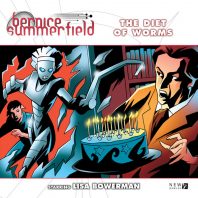
Released October 2008
The Depository is an incredible store of the vast literary remains of Earth’s cultural greats with no history of alien invasion or threat, and Bernice has arrived to apply for a job that just may offer the stable environment that Peter and she require after so many brushes with death and scheming machinations. However, beneath the safe veneer of an atmosphere shield and a friendly bar and patisserie, the most unique threat Bernice has yet encountered has made itself at home within the words of others.
Like every story in this ninth series, ‘The Diet of Worms’ is a completely standalone affair bar the final moments when a message from Bev Tarrant brings Bernice’s past with the Collection back to the forefront. Matthew Sweet has made a name for himself with quirky and imaginative ideas, and the core concept here of what can only be described as actual bookworms is certainly befitting of that reputation. Indeed, with a more fanciful theme in general that quite prominently presents the works of Barbara Cartland as among Earth’s lasting greats, these beings who can only speak the content of what they absorb present a unique risk for the Depository that also pose an intrinsically unique challenge for communication. With Bernice gaining importance unwittingly through the words of her diary that show just how far she has come as a character as well as through a list of words that she feels may help the worms vocalise their thoughts and experiences, the story is quick to point out Bernice’s strengths and faults in equal measure, and her single mother status within the context of the literary past becomes a surprisingly emotional source of discussion.
Indeed, as Bernice must again confront the danger that seems to court her every move and the position that her travels continue to put Peter in, Peter spends his time with the robotic cake lady Mrs. Tishpishti who is played with such charm and verve by Beth Chalmers. Thomas Grant and she share an easy chemistry together that adds an intriguing dynamic to the usual relationship of a child being cared for, and the entire script is filled with very intelligent dialogue that also portrays the strengths and burgeoning confidence of Peter in what becomes one of the character’s strongest appearances yet. It’s this quality of dialogue that prevents the entire production from ever seeming like a farce despite the collection of what superficially seem like facetious and sometimes dull ideas, imbuing an undeniably engrossing quality to every event at hand while balancing the drama and humour perfectly.
‘The Diet of Worms’ makes excellent use of its very small cast, and the presence of several robots along with use of Beth Chalmers in a dual role makes the production feel quite full within the claustrophobic confines of the Depository that has seen better days. David Darlington once more provides superb sound design, and the papers Bernice brought along from Mycroft Holmes ties the story nicely into the franchise’s past even before Bev’s fateful note appears that confidently hints at what is yet to come. In fact, as a standalone story, ‘The Diet of Worms’ succeeds in just about every regard, and keeping this story as a standalone one in a series filled with them is a bold move. However, perhaps because of that very fact, it is much less climactic than a typical series finale, and the tease for the coming series only reaffirms that this entire series has been a placeholder, albeit a brave one filled with confidence and novel ideas.
- Release Date: 10/2008


Leave a Reply